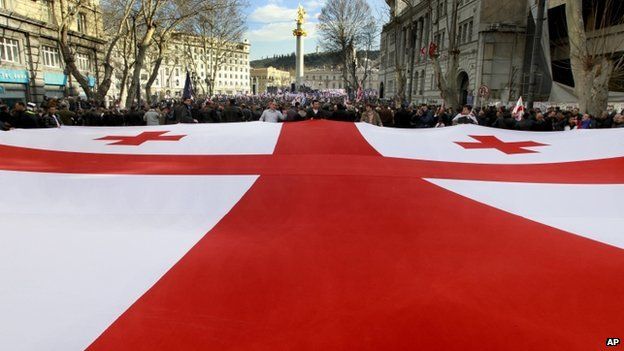Unrest tilts Georgia towards Russia
- Published

As Georgian leaders head to the Eastern Partnership summit in Riga, they will find it hard to hide their disappointment.
Because the one thing that they were hoping to get for their country from Riga was endorsement of a visa-free travel policy to other European countries.
They are likely to come home empty-handed.
This ex-Soviet nation, which has strong pro-Western aspirations, says it has delivered on promised reforms bringing Georgia into line with European and international standards of governance.
But in its assessment of the country's progress, the European Commission said on May 8 that more needed to be done to achieve its goal.
Last year, three former Soviet countries - Georgia, Ukraine and Moldova - signed an Association Agreement with the EU.
Part of this agreement includes a visa liberalisation policy whereby short-term, visa-free travel within the Schengen area will be granted to citizens of those countries.
The aim is to incentivise the EU's so-called Eastern partners to undergo reforms across a broad range of issues, from security and immigration to human rights and corruption.
In early May, in an open letter addressed to the heads of European institutions, Georgia's political leaders urged Europe to endorse a visa-free regime, which they said would be "a long-awaited tangible reward for reforms".
What is the significance of joint Georgia and US military drills?
Russian ties
The key word here is tangible. Georgia's political leadership desperately needs to demonstrate to the population that becoming part of the European family is more than just a dream.
But a slide in its popularity and a continuing malaise in Georgia's economy may be prompting Georgians to reconsider the EU's merits.
A recent opinion poll conducted by the US-based National Democratic Institute suggests that while a majority of Georgians still support the country's pro-Western and pro-Nato aspirations, a new trend of increasing support for the Russian-led Eurasian Union has also been spotted.
In some ways, that trend of more Georgians supporting closer ties with Russia makes perfect sense.
Many Georgian businesses and families economically depend on their northern neighbour.
Georgian politics:
Following the collapse of communism in the USSR in 1991, Georgians voted overwhelmingly for the restoration of independence and elected nationalist leader Zviad Gamsakhurdia as president.
However, Gamsakhurdia was overthrown by opposition militias which, in 1992, installed former Soviet Foreign Minister Eduard Shevardnadze as the country's new leader.
He held office for 11 years before being ousted in the Rose Revolution of November 2003 following mass demonstrations over the conduct of parliamentary elections.
The Georgian Dream party has been in power since the parliamentary election of 2012, unseating the United National Movement, whose former chairman Mikheil Saakashvili stood down after two terms as president of Georgia in 2013.
Russia is one of the top destinations for Georgian agricultural produce, wine and mineral water.
It is also the main target for Georgian nationals seeking work abroad.
But the relationship between Russia and Georgia is a troubled one.
In recent months, Russia has extended its control of Georgia's two breakaway territories by signing "strategic alliance" agreements with South Ossetia and Abkhazia - both are backed financially and militarily by Russia.
Government problems
It is against this backdrop, and the fall in Georgia's national currency (it has lost 30% of its value against the US dollar since November) that the country's governing coalition, Georgian Dream, finds itself on shakier ground than it has been at any time since coming to power in 2012.
Earlier in May the government faced a vote of confidence in parliament following the resignation of seven cabinet ministers within the space of 10 months.
It won easily - the coalition holds a majority in parliament - and 32-year-old Prime Minister Irakli Garibashvili explained at the time that the vote was merely a formality.
However, many in Georgia suspect that Mr Garibashvili is not fully in control of his government.
Instead the former PM, the country's only billionaire, Bidzina Ivanishvili, is the man Georgians believe truly pulls the levers of power.
Mr Ivanishvili's Georgian Dream coalition won a landslide victory in parliamentary elections in October 2012, defeating former president Mikheil Saakashvili's United National Movement party.
He promised judiciary reforms with the slogan "restoration of justice".
But opponents say that that restoration has been selective.
More than 100 former government officials are under investigation, many have been jailed and others are still awaiting trial.
Mr Saakashvili, who left Georgia shortly after the end of his presidential term, is wanted by the authorities on a number of charges.
After serving just over a year as prime minister, Mr Ivanishvili resigned his position and appointed his former aide Irakli Garibashvili.
And while Bidzina Ivanishvili no longer holds public office, he enjoys giving his assessment of the political situation in the country on his weekly TV show.
Lack of unity
He frequently criticises the country's president, Giorgi Margvelashvili, for his decision to take up residence in the palace built by his predecessor, which irritates Mr Ivanishvili.
And there is not much unity between the president and the prime minister either.
The two men frequently clash over who should represent Georgia on the international stage.
Privately, members of the diplomatic community in Georgia complain that the cat-fighting weakens the Georgian government and the country.
Yet despite the widespread poverty, and the lack of clarity on who is in charge, one thing is tangible - that Georgia is a working democracy.
It has made significant progress in recent years both under the UNM and the Georgian Dream, leaving behind the autocratic rule common in other former Soviet republics, and it has a vibrant and plural media.
But to complete its marathon towards the eventual embrace of the EU, Georgia will have to cross the finishing line without tripping over Russian - or its own - stumbling blocks.